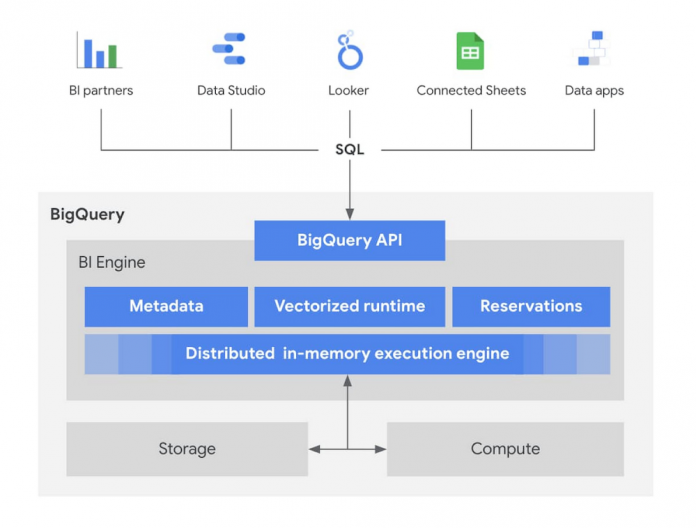Customers who work with data warehouses, running BI on large datasets used to have to pick low latency but trading off freshness of data. With BigQuery BI Engine, they can accelerate their dashboards and reports that connect to BigQuery without having to sacrifice freshness of the data. Using the latest insights helps them make better decisions for the business. BI Engine enables customers to be able to get “formula one” performance for their queries across all BI tools that connect with BigQuery, thereby helping them leverage existing investments.
Last year, we launched a preview of BigQuery BI Engine, a fast in-memory analysis service that accelerates and provides sub-second query performance for dashboards and reports that connect to BigQuery. BI Engine works with any BI or custom dashboarding tool. This was designed to help analysts identify trends faster, reduce risk, match the pace of customer demand, and improve operational efficiency in an ever-changing business climate. With this launch, customers were able to build fast, interactive dashboards using any of the popular tools like Looker, Tableau, Sheets, PowerBI, Qlik or even any custom application.
And our customers have realized this value quickly. “We have seen significant performance improvements within BigQuery after implementing BI Engine. Our views and materialized views have been especially improved after implementing BI Engine.” says Yell McGuyer, Data Architect at Keller Williams Realty.
Today, we are very excited to announce the general availability of BigQuery BI Engine for all BI and custom applications that work with BigQuery!
BI Engine Acceleration works seamlessly with BigQuery
Native Integration with the BigQuery API. BI Engine natively integrates with the BigQuery API, which means that if your dashboards use standard interfaces like SQL, BigQuery APIs or JDBC/ODBC drivers to connect to BigQuery, then BI Engine is automatically supported. No changes are required for applications or dashboards to get sub-second, scalable dashboards up and running. If you run a query with BigQuery and if it can be accelerated, it will be accelerated with BI Engine.
Intelligent Scaling. Customers do not have to worry about efficiently using the memory reservation, BI Engine does it for you based on the access patterns. BI Engine leverages advanced techniques like vectorized processing, advanced data encodings, and adaptive caching to maximize performance while optimizing memory usage. It can also intelligently create replicas of the same data to enable concurrent access.
Simple Configuration. The only configuration needed when using BI Engine is to set up memory reservation, which is provided in a fine-grained increment of 1GB each.
Full Visibility. Monitoring and logging are critical for running applications in the cloud and to gain insight into performance and opportunities for optimization. BI Engine integrates with familiar tools such as Information Schema for job details (e.g. aggregate refresh time, cache hit ratios, query latency etc) and Stackdriver for monitoring of usage.
Getting started with BI Engine
BI Engine is now available in all regions where BigQuery is available.
You can sign up for a BigQuery sandbox here and enable BI Engine for your project. Feel free to read through the documentation and quick-starts guides for popular BI tools. You can also watch the demo from Data Cloud Summit to see how BI Engine works with BI tools like Looker, Data Studio and Tableau.
If you’re a partner with an integration to BigQuery, consider joining the Google Cloud Ready – BigQuery initiative. You can find more details about the program here.
Cloud BlogRead More


